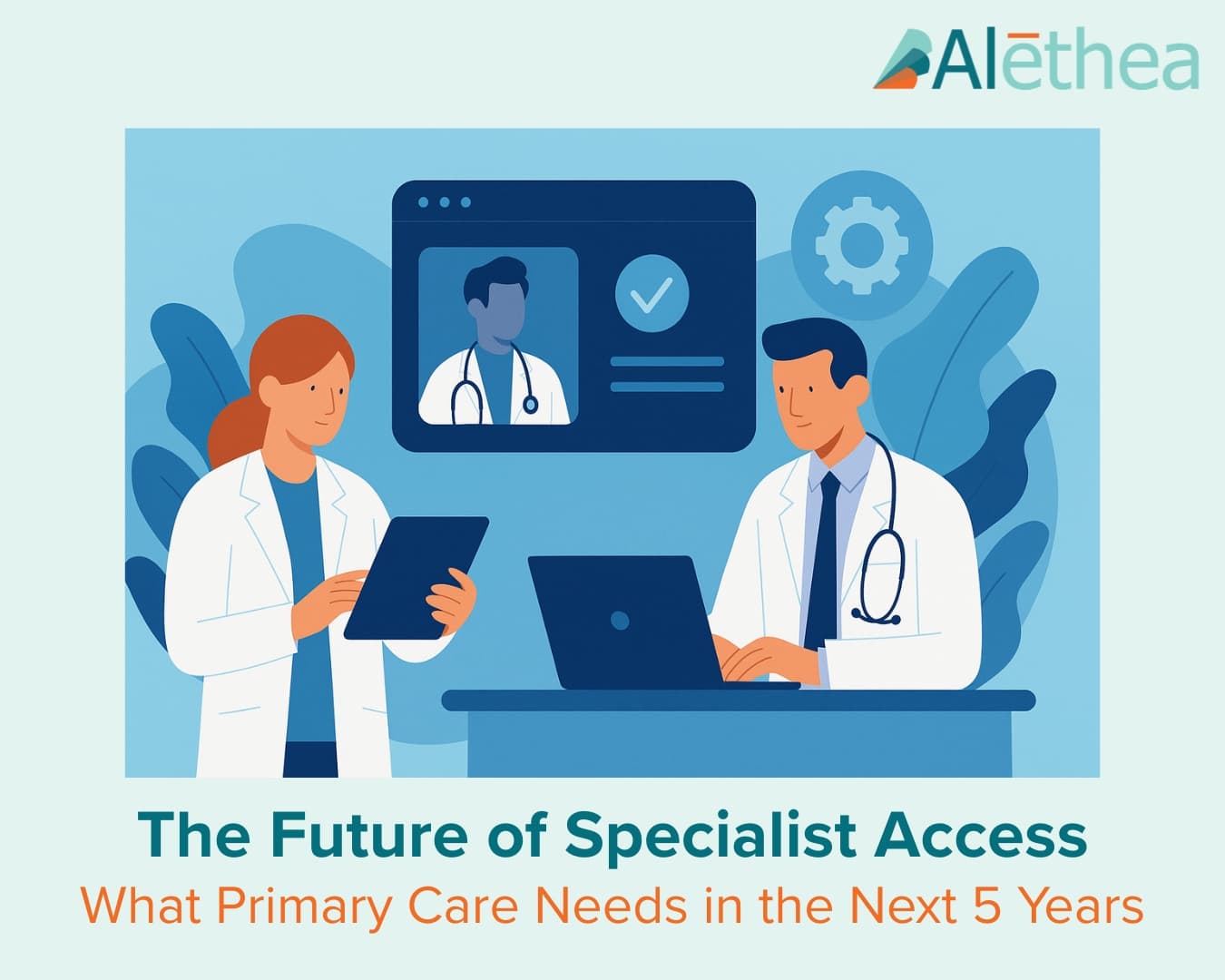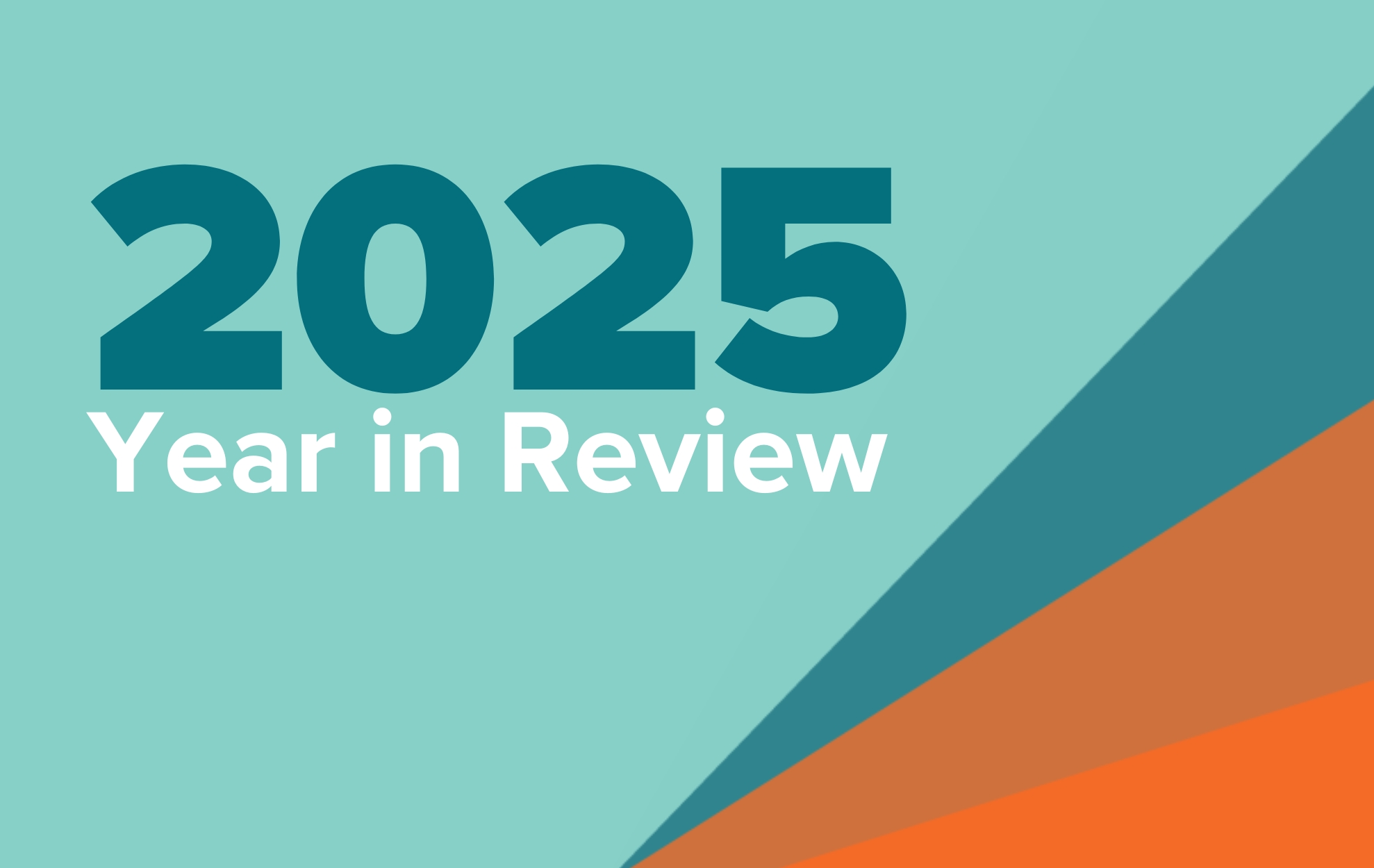The Future of Specialist Access: What Primary Care Needs in the Next 5 Years

Primary care is evolving rapidly, and how Primary Care Providers (PCPs) collaborate with specialists is at the heart of this transformation. Over the next five years, advances in technology, changing healthcare models, and a greater emphasis on equitable patient care will reshape primary care practices. Recognizing and adapting to these changes will be essential for PCPs looking to improve patient outcomes, streamline their workflows, and enhance overall patient care experiences.
Advanced Access and the Demand for Timely Specialist Insights
One of the most significant trends influencing primary-specialist relationships is the shift toward advanced access scheduling, supported by tools like electronic consultations (eConsults). Advanced access aims to reduce patient wait times and improve the continuity of care by adopting patient-centred scheduling approaches (Breton et al., 2024). Platforms like Alethea, which provide specialist advice within 24 - 48 hours, help providers respond quickly to clinical concerns without the delays traditionally associated with referrals (Breton et al., 2023). This approach not only accelerates clinical decision-making but also reduces unnecessary patient referrals, significantly enhancing patient satisfaction and care quality.
Team-Based Care Through Enhanced Collaboration
Interprofessional collaboration is increasingly central to effective primary care. Evidence continues to highlight the benefits of cohesive teamwork among PCPs, specialists, nurses, and allied health professionals, particularly in complex or underserved environments such as rural communities (Breton et al., 2024). Digital solutions that clarify roles and responsibilities across professional teams empower providers to manage challenging cases collaboratively and efficiently, ultimately strengthening patient care and improving outcomes.
Integrating Specialist Advice into Daily Clinical Practice
Today's primary care providers juggle numerous demands within their clinical workflows. The technology infrastructure providers use significantly influences decisions around specialty referrals (Forrest et al., 2006). Recognizing this, Alethea integrates seamlessly into EMRs like Ava, enabling providers to effortlessly initiate eConsults directly from patient charts, automatically pulling in relevant clinical information without additional manual steps. Features like integrated photo uploads and automatic patient record attachments make specialist consultation intuitive, freeing PCPs from administrative burdens and allowing more time for direct patient care.
Reducing "Scope Inversion" and Empowering Primary Care
A common challenge in healthcare systems is "scope inversion," where specialists end up handling routine primary care issues, creating inefficiencies and unnecessary costs (Hashim, 2021). By enabling PCPs to confidently address common clinical questions through rapid asynchronous advice from specialists, platforms like Alethea help reverse scope inversion. This approach maximizes specialist resources for more complex cases and enables primary care providers to handle many clinical concerns independently, thereby improving system efficiency and reducing unnecessary referrals.
Artificial Intelligence as a Clinical Decision Support Partner
Artificial intelligence (AI) is rapidly emerging as a valuable support tool for clinical decision-making. Recent studies highlight AI's capability to assist PCPs in patient triage, diagnostic interpretation, and evidence-based care recommendations (Ma et al., 2024). Clinically-informed AI tools like Alethea's Decision Support for ENT and dermatology provide immediate, reliable second opinions, helping providers confidently validate their diagnostic decisions in seconds. Integrating AI support into primary care practice enhances the speed and quality of decision-making while minimizing diagnostic uncertainty.
Creating Equitable Access to Specialist Expertise
Access to specialist care remains uneven, especially in rural and underserved communities. Digital health solutions, notably eConsults, significantly reduce geographic barriers and disparities by connecting PCPs and specialists seamlessly, regardless of their locations (Breton et al., 2023). Platforms dedicated to equitable access are essential in ensuring all patients, regardless of their location, receive timely, high-quality specialist insights. This equitable approach supports better health outcomes across diverse communities.
Supporting Physicians and the Primary Care Workforce
Primary care faces ongoing challenges, including physician burnout and workforce shortages. Digital platforms designed to reduce administrative tasks and simplify specialist interactions directly address these pressures, promoting physician satisfaction and long-term career sustainability. Ongoing training and digital literacy support are essential to help providers seamlessly adopt and leverage these new technologies. Solutions that foster professional development, engagement, and community will be instrumental in retaining an effective and motivated primary care workforce.
Aligning With Healthcare Policies and Outcomes Measurement
Healthcare policies increasingly prioritize care that is coordinated, continuous, and digitally enabled (National Academies of Sciences, Engineering, and Medicine, 2021). Platforms aligned with these strategic directions are well-positioned to drive continuous improvement. Transparent reporting of key outcomes such as reduced wait times, improved patient satisfaction, and enhanced clinical effectiveness is increasingly expected.
At Alethea, compliance and privacy are foundational. We adhere strictly to Alberta's Personal Information Protection Act (PIPA), requiring verbal patient consent for image sharing, just like traditional referrals. Our proactive approach includes submitting a comprehensive Privacy Impact Assessment (PIA) to Alberta's Office of the Information and Privacy Commissioner (OIPC). We also support partner clinics by recommending updates to their PIAs, ensuring comprehensive privacy compliance. All AI database images are rigorously anonymized, in line with College of Physicians & Surgeons of Alberta (CPSA) guidelines, enabling providers to leverage our digital solutions confidently.
Looking Ahead: A Future-Ready Primary Care Landscape
Over the next five years, primary care will continue evolving toward more timely, collaborative, and digitally integrated models. Seamless specialist access, robust AI-enabled decision support, and solutions tailored to provider workflows will play increasingly central roles. Providers equipped with innovative digital tools will lead the way in delivering accessible, equitable, and sustainable patient care.
At Alethea, we're committed to empowering primary care providers with technology that anticipates and meets the evolving demands of healthcare. By embracing these future-focused strategies, PCPs can confidently deliver exceptional patient care and help shape a healthcare system built on innovation, collaboration, and equitable access.
References:
Breton, M., Deville‑Stoetzel, N., Gaboury, I., et al. (2024). Comparing the implementation of advanced access strategies among primary health care providers. Journal of Interprofessional Care. https://doi.org/10.1080/13561820.2023.2173157
Breton, M., et al. (2023). Ten years later: A portrait of the implementation of the advanced access model in Quebec. Healthcare Management Forum. https://doi.org/10.1177/08404704231181676
Forrest, C. B., Nutting, P. A., von Schrader, S., et al. (2006). Primary care physician specialty referral decision making. Medical Decision Making, 26(1), 76–85. https://doi.org/10.1177/0272989X05284110
Hashim, M.J. (2021). Provision of primary care by specialist physicians: a systematic review. Family Medicine and Community Health. https://doi.org/10.1136/fmch-2019-000247
Ma, Y., et al. (2024). Promoting AI Competencies for Medical Students: A Scoping Review. arXiv. https://doi.org/10.48550/arXiv.2407.18939
National Academies of Sciences, Engineering, and Medicine. (2021). Implementing High‑Quality Primary Care. Washington, DC: The National Academies Press. https://doi.org/10.17226/25983







